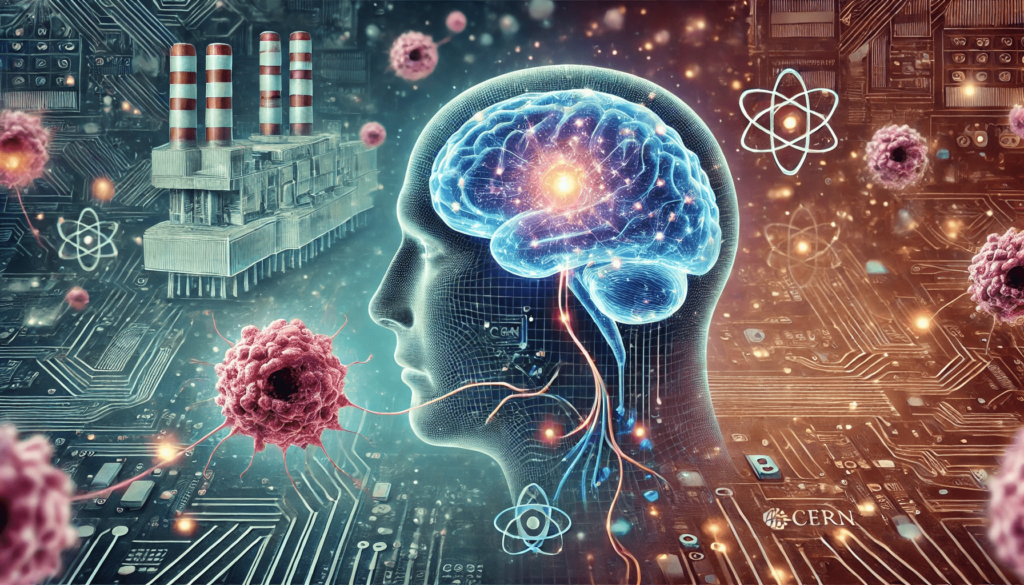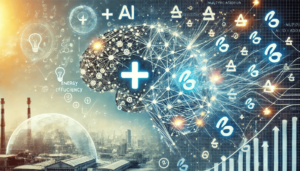CERN’s AI Revolution: Transforming Cancer Treatment and Beyond

CERN leverages AI to pioneer new frontiers in cancer treatment and neurological care.
- How is CERN applying its AI technology to revolutionize cancer treatment and neurological care?
- What are the implications of CERN’s AI models for global healthcare, particularly in low- and middle-income countries?
- What ethical and future considerations arise from integrating AI into medical diagnostics and treatment?
In a world where technology and healthcare increasingly intersect, the European Organization for Nuclear Research (CERN) is pioneering innovations that could redefine cancer treatment and neurological care. As reported by EL PAÍS, CERN is leveraging artificial intelligence (AI) models initially developed for particle physics to revolutionize how we diagnose and treat complex medical conditions.
From Particle Accelerators to Patient Care
CERN is globally renowned for its groundbreaking work in particle physics, particularly through the Large Hadron Collider (LHC). However, the same technology used to explore the fundamental particles of the universe is now being repurposed to tackle some of humanity’s most pressing health challenges. By applying their expertise in managing vast amounts of data securely and efficiently, CERN is developing AI-based solutions that could significantly enhance medical diagnostics and treatment protocols.
Decentralized Data Processing: A New Paradigm in Healthcare
One of the critical innovations CERN brings to the table is its decentralized data processing system. Unlike traditional models that centralize patient data, CERN’s approach processes information locally within hospitals. This method not only enhances data security and patient privacy but also optimizes resource utilization when multiple hospitals collaborate. Luigi Serio, a CERN scientist responsible for developing AI applications in healthcare, emphasizes that this model ensures robustness and trustworthiness, backed by CERN’s reputation as a non-profit and impartial institution.
Enhancing Stroke Treatment with AI: The Truststroke Project
Stroke remains a leading cause of mortality and long-term disability worldwide. Recognizing the urgent need for improved treatment strategies, CERN has developed the Truststroke Project. This AI-driven initiative is already making a tangible impact, having been applied to around 10,000 patients in hospitals across Germany, Belgium, and the Vall d’Hebron Stroke Unit in Barcelona.
By analyzing brain images and comparing them with trained AI models, the algorithm can predict patient outcomes, recommend therapies, and assess the risk of recurrence. This predictive capability enables healthcare professionals to tailor treatments more effectively, potentially reducing hospital stays and improving recovery rates.
The success of the Truststroke Project illustrates the transformative potential of AI in acute medical conditions. As these models become more refined, we could see a significant shift towards personalized medicine, where treatment plans are customized based on predictive analytics.
A Smarter Approach to Breast Cancer Screening
Breast cancer remains one of the most common cancers affecting women globally. Early detection is crucial for successful treatment, yet current screening models like GAIL have limitations, often not accounting for a comprehensive range of risk factors.
CERN is developing an AI-powered cancer detection program that is expected to be 50% more accurate than existing methods. By incorporating multiple variables—including lifestyle factors, reproductive history, and genetic predispositions—the model aims to provide a more nuanced risk assessment. This could revolutionize how we approach mammograms, allowing for earlier interventions and potentially saving countless lives.
Once validated and regulated, this AI model could become a standard tool in breast cancer prevention programs worldwide. However, its implementation would require careful consideration of ethical issues related to data privacy and the need for extensive clinical testing.
Democratizing Radiotherapy: The STELLA Project
Access to advanced cancer treatments like radiotherapy is disproportionately low in low- and middle-income countries. Recognizing this disparity, CERN is working on the STELLA Project, aiming to enhance linear radiotherapy accelerators (LINACs) with AI to make them more accessible and user-friendly.
By integrating AI, these machines can become easier to operate, reducing the dependency on highly trained specialists who are often scarce in resource-limited settings. AI can assist in predicting equipment failures, guiding maintenance, and even automating parts of the treatment planning process.
While this technology holds immense promise, its success depends on effective implementation strategies, including training local healthcare providers and ensuring sustainable maintenance models.
Predicting Neurological Disorders with AI
Beyond cancer, CERN’s AI applications extend to neurology. By modeling the brain as a complex graph of interconnected neurons, CERN has developed algorithms capable of detecting abnormalities that could indicate tumors, strokes, or even the early onset of Alzheimer’s disease and dementia.
This technology is currently undergoing clinical testing at the Kapodistrian University Hospital in Greece. The ability to predict the evolution of neurological conditions could be a game-changer in early diagnosis and intervention, potentially improving patient outcomes significantly.
As someone deeply interested in both technology and healthcare, I find this convergence incredibly inspiring. The prospect of predicting and possibly preventing debilitating conditions through AI is a testament to human ingenuity and our relentless pursuit of better health for all.
The Broader Implications and Future Perspectives
CERN’s ventures into healthcare AI signal a broader shift in how we can repurpose technological advancements from one field to address challenges in another. However, these developments also raise important questions and considerations.
Ethical Considerations and Data Privacy
While decentralized data processing enhances privacy, the use of AI in healthcare necessitates stringent data protection measures. Ensuring patient confidentiality while allowing for the collaborative training of AI models is a delicate balance that must be carefully managed.
International regulations and standards may need to evolve to address the complexities of AI in healthcare, potentially leading to new frameworks for data sharing and patient consent.
Bridging Global Health Inequalities
Projects like STELLA highlight the potential of AI to reduce disparities in healthcare access. By making advanced treatments more accessible in underserved regions, we could see significant improvements in global health outcomes.
However, technology alone cannot solve systemic issues. Investments in infrastructure, education, and local economies are essential to support these technological advancements.
The Role of Collaboration in Innovation
CERN’s partnerships with hospitals and universities across Europe demonstrate the power of collaboration. By combining expertise from different sectors, we can accelerate innovation and bring cutting-edge solutions to market more quickly.
Witnessing such collaborative efforts reminds me of the importance of interdisciplinary approaches. In my own work, I’ve seen how bringing together diverse perspectives can lead to breakthroughs that might not have been possible in isolation.
A New Frontier in Medicine
CERN’s application of AI to revolutionize cancer treatment and neurological care represents a significant leap forward in medical science. By harnessing the power of AI and data management expertise, we are on the cusp of a new era where predictive analytics and personalized treatments become the norm.
As reported by EL PAÍS, these developments not only offer hope for better patient outcomes but also challenge us to consider the ethical, social, and logistical implications of integrating advanced technology into healthcare.
The fusion of technology and medicine holds immense promise, but it requires careful stewardship. By addressing the challenges head-on and fostering global collaboration, we can ensure that these innovations benefit all of humanity.




